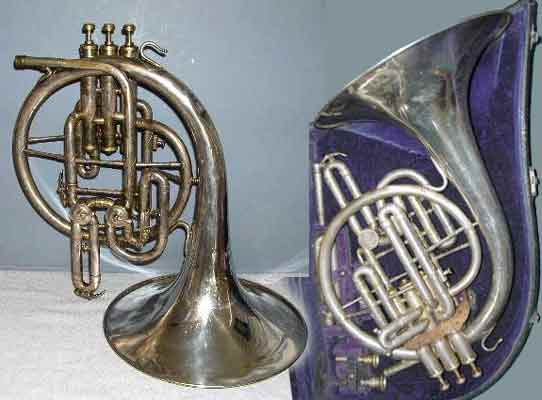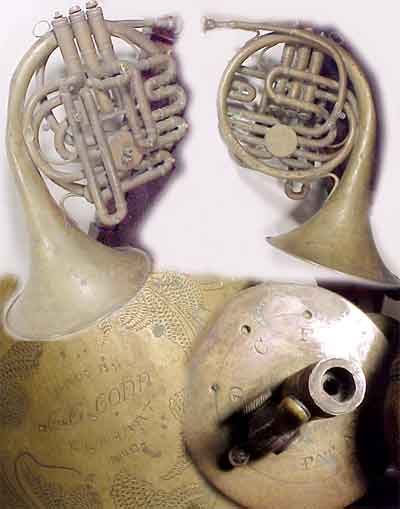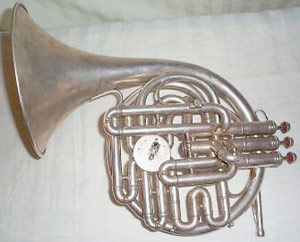EEb Mellophone
Forum rules
Be kind. No government, state, or local politics allowed. Admin has final decision for any/all removed posts.
Be kind. No government, state, or local politics allowed. Admin has final decision for any/all removed posts.
- bearphonium
- 5 valves

- Posts: 1077
- Joined: Wed Jan 17, 2007 9:21 pm
- Location: Making mischief in the back row at 44, 1' 49"N, 123, 8'10"W
We made a similar find in high school; an old mellophone in fair shape, that I think came from my elementary school. Our horn player managed to get it tuned up, and then we took it to metal shop, and straightened out the bell. Keep in mind, at that time there were none of the bell-front marching horns or baritones, so it was a novelty. It became "property" of the jazz band, and I ended up using it to solo in a fast arrangement of "Norweigen Wood" that we played.
Mirafone 186 BBb
VMI 201 3/4 BBb
King Sousaphone
Conn 19I 4-valve non-comp Euph
What Would Xena Do?
VMI 201 3/4 BBb
King Sousaphone
Conn 19I 4-valve non-comp Euph
What Would Xena Do?
- Dan Schultz
- TubaTinker

- Posts: 10424
- Joined: Thu Mar 18, 2004 10:46 pm
- Location: Newburgh, Indiana
- Contact:
I have a couple of those horns here. For the most part, they are pretty useless. That one probably came with other slides to replace the curly-cue one that enabled the horn to play in different keys. Fun.... but not very practicle. Make a lamp out of it!
Dan Schultz
"The Village Tinker"
http://www.thevillagetinker.com" target="_blank
Current 'stable'... Rudolf Meinl 5/4, Marzan (by Willson) euph, King 2341, Alphorn, and other strange stuff.
"The Village Tinker"
http://www.thevillagetinker.com" target="_blank
Current 'stable'... Rudolf Meinl 5/4, Marzan (by Willson) euph, King 2341, Alphorn, and other strange stuff.
- Dan Schultz
- TubaTinker

- Posts: 10424
- Joined: Thu Mar 18, 2004 10:46 pm
- Location: Newburgh, Indiana
- Contact:
Some of those horn not only had additional slides to change the open bugle... they also had sets of slides for the valve circuits. I think I have on here somewhere that was originally made to play in A, Bb, C, F, and Eb. In addition, they were also convertible from high and low pitch. Some of them had two rotors in addition to the three pistons. Pretty funky! There were lots of horns out there that tried to be 'one size fits all' instruments.schlepporello wrote:I can literally feel the love oozing from this post.TubaTinker wrote:Make a lamp out of it!


Too bad we don't have access to any additional tuning slides. I figure they probably went the way of the original case.
Dan Schultz
"The Village Tinker"
http://www.thevillagetinker.com" target="_blank
Current 'stable'... Rudolf Meinl 5/4, Marzan (by Willson) euph, King 2341, Alphorn, and other strange stuff.
"The Village Tinker"
http://www.thevillagetinker.com" target="_blank
Current 'stable'... Rudolf Meinl 5/4, Marzan (by Willson) euph, King 2341, Alphorn, and other strange stuff.
- windshieldbug
- Once got the "hand" as a cue

- Posts: 11516
- Joined: Tue Mar 01, 2005 4:41 pm
- Location: 8vb
They were most often built in F, Eb, D, and C. Often known as "band and orchestra horns", you could get them in High Pitch, Low Pitch, or both.
They worked well pre-marching mellophone, when the town band or orchestra needed an alto, and all you had was dag-@%#$ed cornet players. Hence the right-hand fingering, and an octave above the french horn.
F for orchestra,
Eb for band,
C for playing piano/vocal music without transposing.
I never could figure out the D part, until I saw an old ad that claimed it was a "common" orchestral instrument key.
The two-rotor horns were just a way to keep the other main slides with you, because the valves were mechanical, and you could use none (F), one (whole step; Eb), the other (one and one-half step; D), or both (two and one-half steps; C).
They worked well pre-marching mellophone, when the town band or orchestra needed an alto, and all you had was dag-@%#$ed cornet players. Hence the right-hand fingering, and an octave above the french horn.
F for orchestra,
Eb for band,
C for playing piano/vocal music without transposing.
I never could figure out the D part, until I saw an old ad that claimed it was a "common" orchestral instrument key.
The two-rotor horns were just a way to keep the other main slides with you, because the valves were mechanical, and you could use none (F), one (whole step; Eb), the other (one and one-half step; D), or both (two and one-half steps; C).
Instead of talking to your plants, if you yelled at them would they still grow, but only to be troubled and insecure?
- brianggilbert
- bugler

- Posts: 163
- Joined: Sun Oct 28, 2007 1:37 pm
- Location: Wilmington,DE
We have a playing in my quintet who is our "designated hitter" - he plays trumpet, horn, and even euph all pretty well.
He has one of these horns that has been completely refinished and it does play pretty well. Every once in a while he brings it to rehearsal for a different color. He also has a different crook for every occasion.
Neat conversation piece though.
He has one of these horns that has been completely refinished and it does play pretty well. Every once in a while he brings it to rehearsal for a different color. He also has a different crook for every occasion.
Neat conversation piece though.
Chesapeake Silver Cornet Brass Band
Aldersgate Brass
Besson 982
Mouthpieces-a-Plenty
Aldersgate Brass
Besson 982
Mouthpieces-a-Plenty
-
Sally Larsen
- bugler

- Posts: 87
- Joined: Sun Apr 04, 2004 7:14 pm
Meollow-phone
The leader of our band plays a vintage version of this... he started on cornet, and made a glorious change. Some day we'll transition him to Eb tuba.
>Sal (welcoming people who can transpose quickly) Larsen
>Sal (welcoming people who can transpose quickly) Larsen
-
eupher61
- 6 valves

- Posts: 2790
- Joined: Tue Oct 10, 2006 9:37 pm
Have any of you ever seen a mellophone with switch valves? I used to have one (borrowed from my HS bandroom...permanently, after it had been abandoned in the OLD bandroom)that had two valves that put it into C, D, Eb, or F. Not valves in terms of normal playing valves, but they locked into place. I think it had the Wurlitzer name on it. It disappeared from my possession during a move, I think. Too bad, it was fun.
- windshieldbug
- Once got the "hand" as a cue

- Posts: 11516
- Joined: Tue Mar 01, 2005 4:41 pm
- Location: 8vb
The piston/rotary valve mellophones we have been discussing are EXACTLY that. The rotary valves are mechanical only. This is a 1912 Buescher.eupher61 wrote:Have any of you ever seen a mellophone with switch valves? I used to have one (borrowed from my HS bandroom...permanently, after it had been abandoned in the OLD bandroom)that had two valves that put it into C, D, Eb, or F. Not valves in terms of normal playing valves, but they locked into place. I think it had the Wurlitzer name on it. It disappeared from my possession during a move, I think. Too bad, it was fun.

Then, there were these 1907 Conn's, that had only one LARGE valve to do the same thing...


Instead of talking to your plants, if you yelled at them would they still grow, but only to be troubled and insecure?
- Dan Schultz
- TubaTinker

- Posts: 10424
- Joined: Thu Mar 18, 2004 10:46 pm
- Location: Newburgh, Indiana
- Contact:
Well.... for starters... F horns are not 'French horns'. The French had little to do with the origin of F horns. They evolved in Germany and eastern Europe.wchoc86 wrote:if you compared a single f-horn to a mellophone in f, would the only difference be piston vs. rotary? and if so, why did french horns become so wide spread and mellophones(at least the non-marching kind) become a relic?
Anyway... to your original question... I suppose there would be no difference between whether the horn had rotors or pistons. The conventional 'horn in F' has a much longer open bugle than the mellophone. Therefore, the F horn has a much greater range. It has little to do with whether the F horn is a single or a double. All the single or double issue does with the 4th rotor is it cleans up a bunch of intonation issues when playing the horn in extreme ranges.
Dan Schultz
"The Village Tinker"
http://www.thevillagetinker.com" target="_blank
Current 'stable'... Rudolf Meinl 5/4, Marzan (by Willson) euph, King 2341, Alphorn, and other strange stuff.
"The Village Tinker"
http://www.thevillagetinker.com" target="_blank
Current 'stable'... Rudolf Meinl 5/4, Marzan (by Willson) euph, King 2341, Alphorn, and other strange stuff.
- windshieldbug
- Once got the "hand" as a cue

- Posts: 11516
- Joined: Tue Mar 01, 2005 4:41 pm
- Location: 8vb
No, the standard horn in F is an octave lower than the mellophone in F, and actually the same length as the F tuba.wchoc86 wrote:if you compared a single f-horn to a mellophone in f, would the only difference be piston vs. rotary?
Because it is player higher in the overtone series, and is effectively an alto instrument, it can be likened to a valved baroque trumpet.
There have been French horns made with piston valves, by Conn and others. They were primarily made during wartime, when rotary valve were considered to be "Germanic".
I think that it was the demise of the town band due to other forms of entertainment that made this form of horn playable by cornet players less desirable. The bell up form of alto ("tenorhorn") is still used in British Brass Bands.
Instead of talking to your plants, if you yelled at them would they still grow, but only to be troubled and insecure?
-
Naptown Tuba
- bugler

- Posts: 210
- Joined: Mon Mar 27, 2006 1:34 pm
- Location: Indy
I've got one of the old ones that have the crooks that are attatched at the mouthpipe to make it in F, Eb, D, or C. I used it a long time ago in a quintet when a french horn player was no where to be found. These were also referred to as "peckhorns" in days gone by. And that's a pretty good name for them, as the tone produced was never much of a desirable one.
Gnagey/King Satin Silver CC